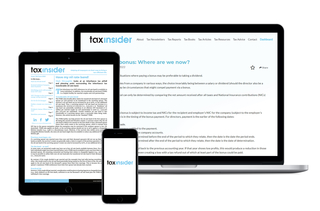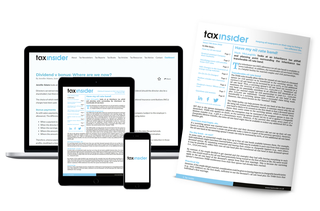New articles published
in March 2025
-
Loans to Traders & Capital Loss Relief: The Hidden Tax Issues You Shouldn’t Miss
The capital gains tax (CGT) legislation in TCGA 1992, s 253 (relief for loans to traders) provides for capital gains tax (CGT) loss relief where an individual has lent money to a ‘trader’ which has been used for the purposes of the trade but where the debt has become irrecoverable. The trader could be a company or an unincorporated business but must be trading or preparing to trade.
Ken Moody looks at capital loss relief for loans to traders and (as usual) finds a few ‘quirks’ to chew over in the legislation and the related HMRC guidance.
-
Lifetime Gifts & IHT: The Long-Term Impact You May Not Expect
Many taxpayers have heard of a ‘seven-year rule’ for inheritance tax (IHT) purposes. It is widely assumed that lifetime gifts escape the IHT net if the donor survives at least seven years after making the gift.
Mark McLaughlin points out that lifetime gifts can have a much longer knock-on effect for inheritance tax purposes than many people assume.
-
Online Side Hustle? Make Sure You’re Paying the Right Tax & NI
Although it was originally recorded in use in the 1900s, the expression ‘side hustle’ has been increasingly used in the present century. Various definitions can be found, but generally this will be along the lines of an activity carried out for income to supplement that received from a main source.
Richard Curtis reminds those with secondary sources of online income that they may be subject to tax or National Insurance contributions liabilities.
-
Entertaining Overseas Clients? Know the VAT Recovery Rules
VAT incurred on goods or services used for business purposes can normally be recovered as input tax. However, tax on the provision of business entertainment cannot normally be recovered.
Andrew Needham looks at the VAT recovery position on the entertainment of overseas customers.
-
Business Disincorporation: Key Challenges and Considerations
In my article in last month’s Tax Insider, I explained why it may now be fiscally attractive for some owner-managed businesses to disincorporate. Here are some further considerations.
Kevin Read discusses some key issues to address when considering the disincorporation of a business.
-
The Future of BIKs: How HMRC's 2024 Budget Will Simplify Reporting
On 16 January 2024, there was a HMRC ‘simplification update' announcing the mandation of payrolling benefits-in-kind (BIKs) from tax year 2026/27.
Ian Holloway discusses the October 2024 Autumn Budget confirmation consigning forms P11D and P11D(b) to the legacy dustbin – Almost.
-
Paying Director's Personal Expenses: What’s the Tax Impact
Directors of small companies, especially those with prior experience of self-employment, often overlook the distinction between company funds and personal finances.
Jennifer Adams considers the tax position should a company pay a director's personal expenses.
-
Q&As with Arthur Weller
Some of our most popular articles
-
Tax implications of awarding shares to family members
The employment-related securities legislation deals with arrangements involving shares and securities provided by reason of employment where the full value of the employment reward provided to the employee is not included in the salary package and is charged to tax.
Jennifer Adams considers the tax implications of shares in a family company being awarded or gifted to family members of employees.
-
Decisions, decisions! Partnership or limited company?
A sole trader looking to expand their business might be weighing up the ‘pros’ and ‘cons’ of a partnership or a limited company. They are very different, with not only very different tax consequences, but functions as well.
Chris Thorpe looks at partnerships and companies and considers which business model might be best.
-
Don’t write off your chances of tax relief!
Under the loan relationships rules for companies, debits on loan arrangements are not deductible for corporation tax purposes in some circumstances.
Kevin Read highlights a recent case concerning the loan relationship rules for companies.
-
Who has tipped HMRC off?
When HM Revenue and Customs (HMRC) opens a tax return enquiry, the natural reaction of most taxpayers is to speculate about the reason why their tax return has been selected. In fact, HMRC does not need an excuse to open a tax return enquiry; a small proportion of tax returns are simply selected at random. .
Mark McLaughlin looks at whether a taxpayer can find out if an HMRC enquiry has been opened as the result of an accusation made by a third party.
-
Remuneration in 2024/25 - Important Considerations
When considering the tricky matter of remuneration planning, there are two things to consider; the amount of remuneration, and what form it takes.
Chris Thorpe looks at what to watch out for with regard to paying employees and directors.
-
Alternative ways of paying staff tax-efficiently
Despite the reduction in National Insurance contributions (NICs) in Spring Budget 2024, more employees are paying tax at higher rates on their earnings due to the freezing of tax thresholds. Some may find that any pay rise or bonus attracts additional tax and NICs such that the net pay increase is minimal.
Jennifer Adams looks at some alternatives to rewarding an employee with a pay rise or a bonus.
-
A popular ‘exit’ strategy when a shareholder is retiring
Mark McLaughlin looks at company purchases of own shares and warns not to become too focused on the more difficult rules for capital treatment.
A company purchase of its own shares from a shareholder is a popular ‘exit’ strategy when an individual shareholder is retiring, or a dissenting shareholder is departing.
-
Q&As with Arthur Weller
Subscription Benefits
We asked our subscribers what they love about Tax Insider.
These are the top 7 reasons that they gave us:
Monthly Newsletter
Tax Insider…





